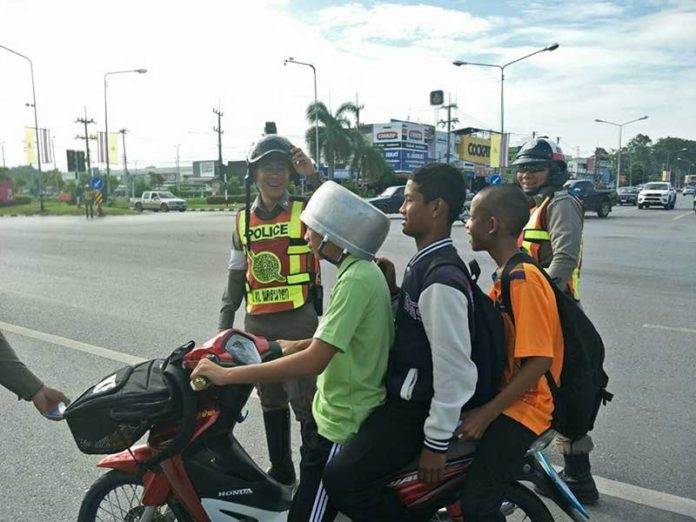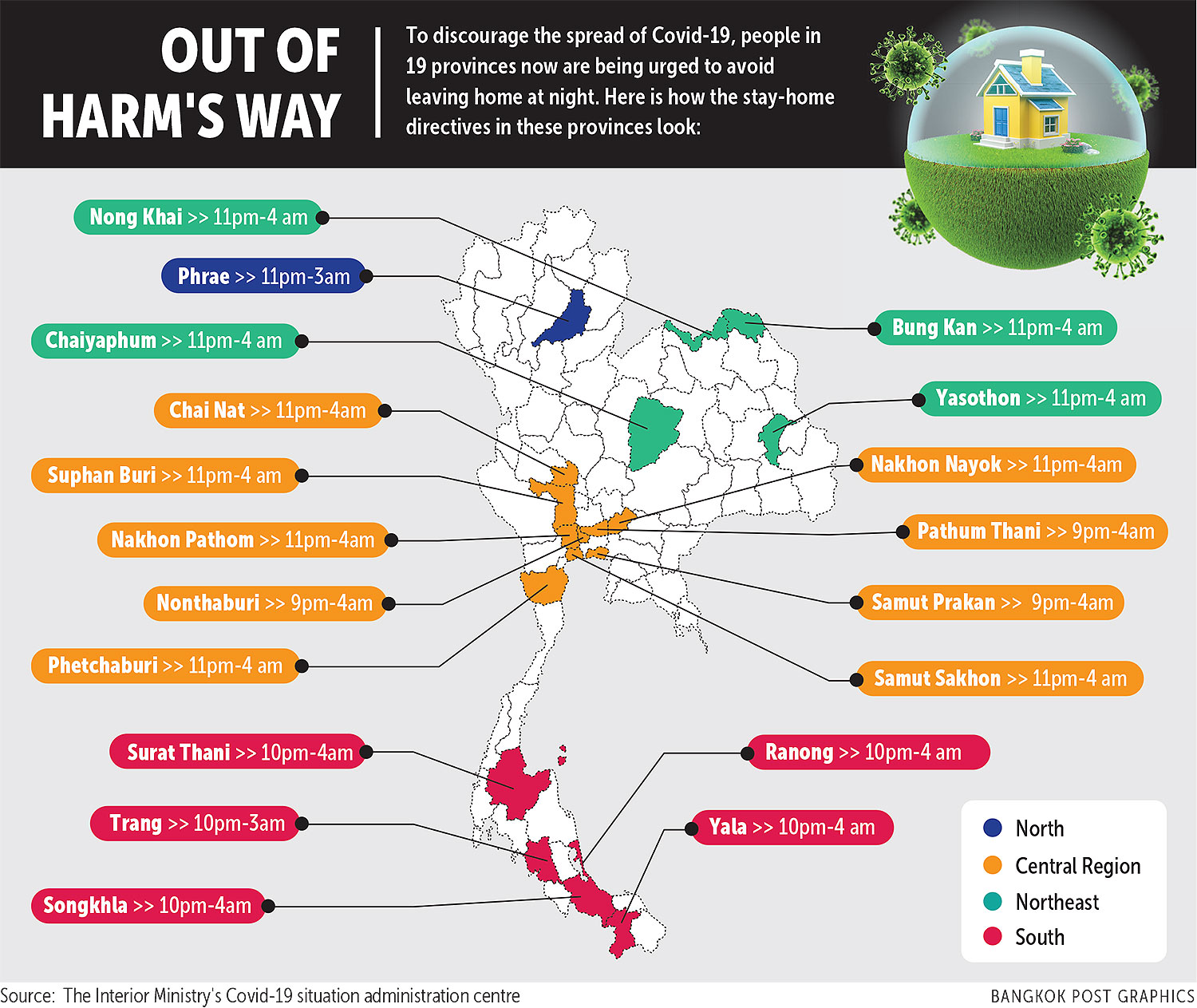The Thai woman was riding on a motorcycle on her way to work when a pickup truck sideswiped her on a rural stretch of asphalt in northeastern #Thailand. The truck's driver was an off-duty police officer. He was drunk.
Orathai Chanhom, the motorcyclist, was catapulted off her bike and killed almost instantly in the crash.
The officer who struck her still has his police job. His driver's licence was not taken away. A court declined to sentence him to prison.
In Thailand, one of the world's most unequal societies, even its roads have a rigid hierarchy, with the poor far more likely to be killed in accidents than the well-off and well-connected.
And there are many deaths: Thailand had the world's second-highest rate of road fatalities per capita, surpassed only by war-afflicted, lawless Libya, according to a 2015 report from the World Health Organisation (WHO).
When it comes to per-capita motorcycle deaths, the country is number one.
The government vowed at a United Nations forum in 2015 to halve the number of road traffic deaths by 2020.
With less than one year to go before the deadline, however, Thailand is a long way from fulfilling that promise, its roads still ranking among the world's 10 most dangerous, with more than 20,000 preventable fatalities a year.
The country has seen a small dip in road deaths since 2015, and Thailand has in place many of the necessary laws to make its roads safer.
But what the government has not addressed is the country's vast gap in wealth, which is the core issue that not only makes its roads so deadly, but has also split the country into two bitterly divided political camps: Thailand's haves and have-nots.
Thailand, named the most unequal country of the 40 major economies surveyed last year by Credit Suisse, has what might be the world's most toxic combination for traffic safety.
Unlike poorer countries, its roads are well paved and made for speed, and the cars driven by the rich and its growing middle class tend to be new and fast.
But many Thai families can only afford a single scooter or motorcycle, and high-quality helmets are a luxury for many, whatever the law says about them being mandatory to wear.
In accidents on the country's crowded roads, it's a devastating mismatch when an air-conditioned SUV collides with a two-wheeler, scattering the detritus of death across the asphalt.
And the aftermath of such accidents are a common, macabre sight on Thai thoroughfares: a shredded tyre, a mangled frame of steel, a bloody plastic flip-flop.
Motorcycle accidents can involve a number of fatalities. Because public transportation is limited outside the big cities, it's not uncommon to see a couple of adults – and even a child or two crammed between them – balanced on a single bike.
Only 12 per cent of Thailand's road traffic deaths involved occupants of cars or other light vehicles, according to the 2018 WHO Global Status Report on Road Safety.
Most of the dead were motorcyclists – or pedestrians.
In many Thai towns, there are few wide, easily usable pavements because, critics say, they are not a priority for the rich and influential, who prefer not to walk in Thailand's oppressive heat.
When there are wide footpaths, they often overflow with street stalls and even motorcycle traffic, pushing people into the roads.
The country's economic disparity is not the only reason Thailand's road deaths are not distributed equally. Justice, too, is handed out unevenly.
For the super rich, or those in positions of authority, the rules of the road may not apply at all.
They know they can speed with impunity and drink heavily before getting behind the wheel, with little fear of the consequences.
In 2012, a young man in a Ferrari – the heir to the Red Bull energy drink fortune – allegedly ploughed into a policeman, dragging him to his death.
The driver, Vorayuth Yoovidhya, was intoxicated, according to a test. Seven years later, he has never been prosecuted.
"What is clear in Thailand is that the roads are not safe for all users," says Evelyn Murphy, who specialises in unintentional injury prevention at the WHO.
"Whether it's cars or motorcycles or pedestrians, the safety of all users of roads must be considered, regardless of income level."
Weak enforcement, compounded by corruption
Speeding, drunken driving and failing to wear proper helmets are the primary causes of traffic deaths in the country, Thai officials say.
While the laws are there to combat each of those factors, enforcement is not.
Wearing helmets is required on two-wheelers, but fines are rarely issued, unless the police need to meet a specific quota during a crackdown period.
Unaccustomed to checkpoints or sirens, speeders or other rule-breakers may not even pull over when caught.
"It's hard to convince people to stop for us when they are not used to stopping," says Jirasunt Kaewsaengeak, the deputy commissioner of the Bangkok Metropolitan Police.
Then, there is corruption. The rich or well-connected know a bribe can often see them on their way if they are nabbed breaking traffic laws.
Bangkok's 3,000 traffic police make an average of £500 a month for working in broiling heat, monsoonal downpours and suffocating smog, which can make even small payoffs highly appealing, and effective.
Twice a year, during the Thai new year in April and the western new year in January, campaigns warn against drunken driving, complete with billboards of gory crashes.
Arrests skyrocket during these periods, but then quickly fall off again.
"If you eat vegetables twice a year and only eat ice cream for the rest of the year, your doctor will think you are crazy," says Tairjing Siriphanich, the secretary-general of the Don't Drive Drunk Foundation of Thailand. "But that's what we are doing with road safety."
A 'sabai sabai' mindset
When asked why so many people die on Thai roads, officials here ascribe it to a "sabai sabai" culture.
Sabai sabai is one of those untranslatable phrases, but it denotes a kind of relaxed contentment. Sabai sabai is one reason Thailand is a great place for a beach holiday.
But it's not a helpful attitude when building national safety standards.
"If police enforce the law, rather than just give a verbal warning, then Thai people are unhappy, and they complain that it's not sabai sabai," Jirasunt says.
A prime example of the effect of the sabai sabai way of life on traffic safety is the approach to helmets. Many motorcyclists simply don't bother.
"People think air pollution is a threat, but they don't think the same way about drunken driving or wearing helmets," says Tairjing of the Don't Drive Drunk Foundation. "We have failed to make people understand that they can save their own lives."
But the authorities can make a difference: in the districts where police are known to hand out fines, helmets are more common.
The government could also do more to educate Thais about helmets, which are often substandard or worn incorrectly.
"When you see someone who makes the effort to put on a helmet without actually strapping it on, it defeats the whole purpose of wearing it," says Murphy of the WHO. "It shows a lack of understanding of basic safety mechanisms."
Shifting the blame
In 2016, 32.7 out of every 100,000 Thais died on the country's roads, according to the most recent WHO estimates. By comparison, the road fatality rate in the United States was 12.4 that year.
In Indonesia, a less-developed southeast Asian country with more potholed roads, the rate was 12.2. Across most of Europe, it was a single-digit number.
Since the government made its promise to halve road deaths, a vow other countries have also made, Thailand has barely inched upwards, moving from the country with the next-to-worst per-capita death tally to the ninth worst.
"No political party has made this an issue. No leader wants to do anything," Tairjing says. "They just make promises to halve the number of road deaths even though they know it's impossible. Maybe they think we'll forget about the promises they made."
The question of who is at fault for Thailand's lack of progress draws a lot of finger pointing by Thai officials.
Chayatan Phromsorn, the deputy director-general of the Office of Transport and Traffic Policy and Planning, the agency that pledged to the United Nations to halve the number of road deaths, said he was not familiar with the document that detailed Thailand's promise. (That English-language document was never made available online in Thai script.)
The official who presented the paper to the United Nations in 2015 said she had done so only because her colleague was unable to attend the conference.
In turn, that colleague, Usanisa Jikyong, said in an email that her office "is not responsible for a road safety initiative in the national level".
Usanisa suggested that another government agency, the department of disaster prevention and mitigation at the Ministry of Interior, was in charge of such matters.
But Chayabol Thitisak, the department's director general, shifted responsibility back to Usanisa's office.
Officials at both agencies said that the blame lay primarily with the police.
"The big factor is law enforcement," Chayabol said. "We have to make people realise that by violating the law they will face severe consequences."
But the police refuse to accept fault.
"As police, there are many things we cannot do," Jirasunt says. "We cannot build more roads and public transportation. We cannot change the number of cars on the road. We cannot change the attitudes of people so they have discipline."
The high human cost
The World Bank estimated in a 2018 study that Thailand could lift its per-capita gross domestic product by 22 per cent by the year 2038 if it successfully halved its traffic fatalities.
Despite that economic upside, the government – led by a retired military general since a 2014 coup – has done little to address the wealth gap that's at the core of Thailand's problem with road deaths.
The country has made a few road-safety improvements. Schools have added road-safety lessons to their curriculums, and there has been some progress in setting new vehicle safety standards.
The numbers do show a slight improvement: road deaths were 7 per cent lower in 2018, with 22,491 deaths compared with 24,237 in 2015.
While the enormous macroeconomic cost of all these road deaths can be measured, what can't be given a money figure is the personal toll inflicted on individuals by the inequality and impunity that menaces Thailand's roads.
The family of Orathai, the killed motorcyclist, has no lawyer to pursue a civil claim. It did not appeal the decision not to jail the officer. There is no further legal action to take.
"In Thailand, the law does not matter," says Chularat, her daughter. "People like us, how can we change anything? Even if we die for no reason, our lives are worthless."
















